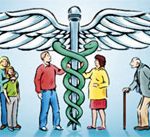Uncommon Common Sense
By Bill Frayer
The Individuation of Poverty

However, there is another effect of the transfer of wealth to fewer and fewer families. The social contract which used to work to help mitigate economic hardship is fraying. This is occurring in the United States, I think, more than in Western Europe and Canada. This is because of the extreme focus on individual freedom and choice in the US. The flip side of this libertarian culture is the individuation of poverty.
The collective support systems to work for income fairness and to provide a safety net for those less fortunate is fraying. Consider the precipitous decline in labor unions. Across all sectors, union membership is declining. Without the protection of collective bargaining agreements, the power is shifting back to those who control the means of production. Workers are left to get by on lower pay and lousy benefits.
I often think, perhaps mistakenly, that it may be somewhat easier to be poor in Mexico than in the US. Mexican families have a stronger tradition of looking out for family members who are suffering from economic hardship. The social structure in the US is all about individual responsibility. If you are poor in the United States, you are basically on your own. The ongoing debate in the US, far from settled, is about the minimum wage. It’s about raising the pay of the poorest workers so they can presumably take care of themselves. It is rarely about providing a safety net for everyone.
Meanwhile, many workers in the lowest quintile in the US, 67 million people, survive by shopping at Wal Mart, using hospital emergency rooms as their primary medical caregivers, and buying a disproportionate share of the lottery tickets, hoping to win their way out of poverty.
We have essentially cut these people loose to fend for themselves. Without affordable higher education, universal health care, reasonable daycare opportunities, and jobs that pay a living wage, many working poor are trapped in and blamed for their poverty. In the words of sociologist Nicolai Genov, “Placing an excessive stress on the expansion of rights and freedoms of individuals by disregarding or underrating the concomitant rise of individual responsibilities brings about social pathologies. They undermine solidarity as the glue of social life.”
For all the talk of gun rights, property rights, privacy rights, and other individualistic concerns, what’s happened to the commitment of all society to the common good? It is popular to blame the people who use the meager welfare benefits available. “Get a job! It’s your responsibility to take care of yourself! I shouldn’t have to pay for your food and lodging!” It’s a popular notion among many, oversimplistic but easy. It’s every man for himself. Sounds good, perhaps, but it ain’t working!
- April 2024 – Issue - March 31, 2024
- April 2024 – Articles - March 31, 2024
- April 2024 - March 31, 2024








